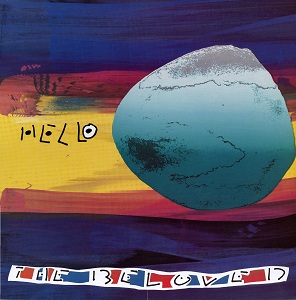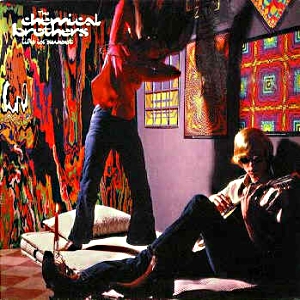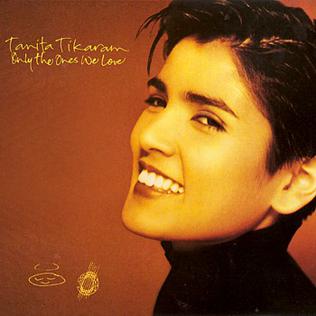"Unchained Melody" is a 1955 song with music by Alex North and lyrics by Hy Zaret. North wrote the music as a theme for the prison film Unchained (1955), hence the song title. Todd Duncan sang the vocals for the film soundtrack. It has since become a standard and one of the most recorded songs of the 20th century, most notably by the Righteous Brothers in 1965. According to the song's publishing administrator, over 1,500 recordings of "Unchained Melody" have been made by more than 670 artists, in multiple languages.

"Hello" is a song by British group the Beloved, released as the second single from their debut album, Happiness (1990). Peaking at Number 19 in the UK charts on 17 February 1990, it was band's highest-charting single until "Sweet Harmony" reached number eight in 1993.

The Blue Nile were a Scottish band which originated in Glasgow. The group's early music was built heavily on synthesizers and electronic instrumentation and percussion, although later works featured guitar more prominently. Following early championing by established artists such as Rickie Lee Jones and Peter Gabriel, the Blue Nile gained critical acclaim, particularly for their first two albums A Walk Across the Rooftops and Hats, and some commercial success in both the UK and the US, which led to the band working with a wide range of musicians from the late 1980s onwards.

"Thieves in the Temple" is a song by American musician Prince from the 1990 soundtrack album Graffiti Bridge. Added at the last minute, it was the final song recorded for the album. "Thieves in the Temple" topped the US R&B chart and became a number six hit in the US, and a number seven hit in the UK. The single also peaked at number nine on the dance chart.

A Walk Across the Rooftops is the debut album by Scottish band The Blue Nile, released on 30 April 1984 on Linn Records in the UK and on A&M Records in the US. Although the album was released to little fanfare and was not a big hit on its initial release, it slowly accumulated fans and sales through word of mouth as the years passed, and by the time the follow-up Hats was released in 1989, A Walk Across the Rooftops had sold 80,000 copies. It continued to gather praise when reissued in 2012.

Hats is the second studio album by Scottish band the Blue Nile, originally released on 16 October 1989 on Linn Records and A&M Records.

High is the fourth and final studio album by Scottish band The Blue Nile, released on 30 August 2004 on Sanctuary Records. A single, "I Would Never", was released one week prior to the album: a second song, "She Saw the World", was made available as a promotional single, but never released officially.

"Crazy" is a song written by English singer-songwriter Seal and English songwriter Guy Sigsworth. Produced by Trevor Horn, it was released by ZTT Records on 26 November 1990 as the lead single from Seal's debut studio album, Seal (1991). The song became his first commercial hit, reaching No. 2 in the United Kingdom, while becoming his first top ten single in the United States. It has since been covered by several artists, including Alanis Morissette, whose version was released as a single from her 2005 compilation album, The Collection.

"We Are Family" is a song recorded by American vocal group Sister Sledge. Composed by Bernard Edwards and Nile Rodgers, they both offered the song to Atlantic Records; although the record label initially declined, the track was released in April 1979 as a single from the album of the same name (1979) and began to gain club and radio play, eventually becoming the group's signature song.

"Killer" is a song by British DJ and record producer Adamski. It was written by Adamski and British singer-songwriter Seal, who also provided vocals, although the original release is credited solely to Adamski. It was released in March 1990 by MCA Records as the first single from Adamski's second album, Doctor Adamski's Musical Pharmacy (1990), and reached number one on the UK Singles Chart. The single spent four weeks at the top in May and June 1990 and sold over 400,000 copies in the UK, earning it gold certification. It also reached number one in Belgium and Zimbabwe and number two in the Netherlands and West Germany.

"Only Love Can Break Your Heart" is a song written by Canadian-American singer-songwriter, musician, and activist Neil Young. It has been covered by many other artists.

"Life Is Sweet" is a song by the English big beat duo the Chemical Brothers, released in August 1995 by Virgin as the second and final single from their first album, Exit Planet Dust (1995). It features Tim Burgess from English rock band the Charlatans on vocals. "Life Is Sweet" reached number 25 on the UK Singles Chart.

"Move (You Make Me Feel So Good)" is a song by American electronic musician Moby, with a chorus sampling from Loleatta Holloway's 1980 song "Love Sensation". It was first released as the title track on Moby's extended play Move, which was issued on August 31, 1993, as his first release on Mute Records in the United Kingdom and on Elektra Records in the United States. It hit number one on the US Billboard Hot Dance Music/Club Play chart and number 21 on the UK Singles Chart.

"Hymn" is a song by American electronica musician Moby. It was released in May 1994 by Mute Records as the first single from the musician's third studio album, Everything Is Wrong (1995). The single version, which was radically remixed from the album original and retitled "Hymn ", peaked at number 31 on the UK Singles Chart and number three in Finland. A 33-minute ambient remix was also released, titled as "Hymn.Alt.Quiet.Version". The accompanying music video for "Hymn" was directed by English director Walter Stern, featuring Moby performing with silver bodypaint.

"Loaded" is a song by Scottish rock band Primal Scream, released on 19 February 1990 as the lead single from their third studio album Screamadelica (1991). Mixed and produced by Andrew Weatherall, it is a remix of an earlier song titled "I'm Losing More Than I'll Ever Have". In 2014, NME placed the song at number 59 in its list of the "500 Greatest Songs of All Time".

"Only The Ones We Love" is a song by British singer-songwriter Tanita Tikaram, which was released in 1991 as the lead single from her third studio album Everybody's Angel. It was written by Tikaram, and produced by Tikaram, Peter van Hooke and Rod Argent.

"Georgy Girl" is a song by the Australian pop/folk music group the Seekers. It was used as the title song for the 1966 film Georgy Girl. Tom Springfield, who had written "I'll Never Find Another You", composed the music and Jim Dale supplied the lyrics. The song is heard at both the beginning and end of the film, with markedly different lyrics. It was nominated for an Academy Award for Best Original Song but the prize went to "Born Free". It was peformed at the 1967 Oscars ceremony by Mitzi Gaynor.

"Like a Motorway" is a song by British pop group Saint Etienne. It appears on their third album, Tiger Bay (1994) and was released as a single by Heavenly Records in May 1994, reaching number 47 on the UK Singles Chart and number 13 on the UK Dance Singles Chart. The US release of Tiger Bay also features an "alternate version" with more complex percussion and electric guitar stings. It also appears on the original soundtrack for the 1994 film Speed, although the single is never heard in the actual film itself.

"The Downtown Lights" is a song by Scottish band The Blue Nile, released in 1989 as the lead single from their second studio album Hats. It was written by Paul Buchanan and produced by the band.

"Saturday Night" is a song by Scottish band The Blue Nile, released in 1991 as the third and final single from their second studio album Hats (1989). It was written by Paul Buchanan and produced by the band. "Saturday Night" reached number 50 in the UK Singles Chart and remained in the top 100 for three weeks. It remains the band's highest charting single in the UK.



















